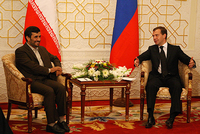At their Oct. 1 meeting in Geneva, representatives from Iran and the P5+1 (the five permanent U.N. Security Council members plus Germany) appeared to make considerable progress. The Iranian government representative agreed to allow the International Atomic Energy Agency (IAEA) to inspect its recently revealed second, secret uranium enrichment facility near the city of Qum. Iran also expressed interest "in principle" in sending its stockpiles of low enriched uranium to Russia and France for further enrichment and conversion into fuel rods for an experimental reactor used for medical purposes.
Russia's role in helping secure these developments remains unclear. Russian leaders clearly do not want Iran to obtain nuclear weapons, due to concerns about Iran's perceived unpredictability and fears about Tehran's long-term ambitions to compete with Moscow for dominance over Eurasia.
The greater worry for Russia, however, is that the United States, Israel, and some European governments might resort to military force to stop the Iranian nuclear program before Iran achieves a weapons capacity. Although a major conflict in the Persian Gulf region could lead to a spike in world -- and Russian -- oil and gas prices, generating windfall profits for Moscow, Russian territory lies uncomfortably close to the site of any military operation. Another war could also encourage Islamist extremism or lead to unpredictable regime change in Iran, with destabilizing consequences.

